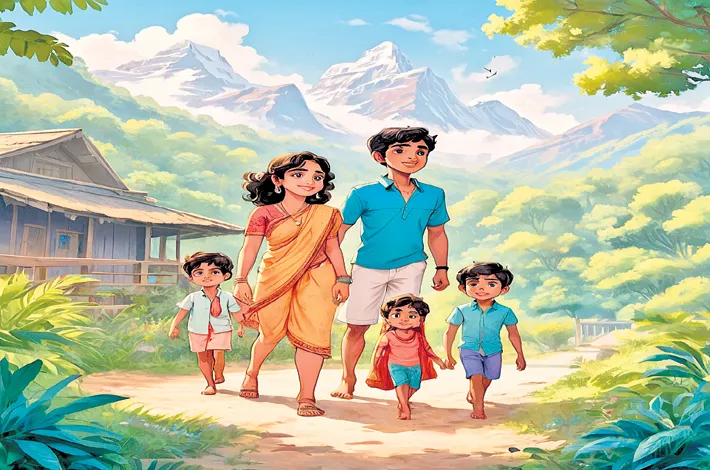The Magic of Trees
09-05-2025 12:00:00 AM

The backyard was a jungle of possibilities. A gnarled mango tree stood in the center, its branches heavy with fruit. Around it were patches of earth, some bare, some sprouting green. Nana handed each child a small trowel. ‘This land has fed our family for generations,’ he said. ‘Now it’s your turn to care for it.’
In the bustling Indian town of Sundarpur, where rickshaws honked and street vendors called out their wares, lived four cousins: Aarav, Meera, Rohan, and little Tara. They spent their summer holidays at their grandparents’ old house, a place with peeling paint but a sprawling backyard bursting with secrets. The cousins loved chasing each other through the narrow lanes or sneaking sweets from the kitchen, but this summer, their grandparents, whom they called Nana and Nani, had a new plan.
One bright morning, as the sun painted the sky orange, Nana clapped his hands. “Enough of your games!” he said, his eyes twinkling. “Today, you’ll learn the magic of gardening.” The children groaned. Gardening sounded like work, not fun. But Nani, with her warm smile and a basket of seeds, promised, “Plant one seed, and you’ll grow a story.”
The backyard was a jungle of possibilities. A gnarled mango tree stood in the center, its branches heavy with fruit. Around it were patches of earth, some bare, some sprouting green. Nana handed each child a small trowel. “This land has fed our family for generations,” he said. “Now it’s your turn to care for it.”
Aarav, the eldest at twelve, was skeptical. “What’s so special about digging dirt?” he asked, kicking a pebble. Nana knelt beside him, his hands rough from years of work. “The earth is alive, beta. It listens if you speak kindly.” He showed Aarav how to loosen the soil, making it soft and welcoming. “Like kneading dough for rotis,” Nani added, winking.
Meera, ten and curious, chose a spot near the mango tree. Nani gave her coriander seeds, tiny and round. “These will spice up our curries,” she said. Meera sprinkled them carefully, her fingers trembling with excitement. Nani taught her to cover the seeds gently, like tucking a baby into bed. “Water them daily, but don’t drown them,” Nani advised. Meera nodded, already imagining a forest of green.
Rohan, eight and full of energy, wanted something big. Nana handed him a pouch of okra seeds. “Bhindi!” Rohan cheered, loving the slimy vegetable in his curries. Nana showed him how to space the seeds, explaining, “Plants need room to breathe, just like people.” Rohan dug with gusto, flinging dirt everywhere, until Nana gently guided his hands. “Patience, beta. The earth rewards those who wait.”
Tara, only five, clung to Nani’s dupatta. “What can I do?” she asked, her voice small. Nani smiled and handed her marigold seeds, bright as the sun. “These will bring color to our garden,” she said. Tara’s eyes widened. Nani helped her press the seeds into the soil, singing a soft lullaby about flowers dancing in the breeze. Tara giggled, mimicking Nani’s song.
Each day, the cousins rushed to the garden after breakfast, their skepticism fading. Aarav noticed tiny sprouts in his patch of tomatoes, their green tips pushing through the soil like brave explorers. “They’re growing!” he shouted, amazed. Nana explained how sunlight and water worked together, like a team. “Science and love,” he said, tapping Aarav’s chest.
Meera’s coriander grew delicate leaves, and she sniffed them proudly, declaring, “I’m a chef now!” Nani taught her to pinch off weak shoots so the strong ones could thrive. “Like choosing your best friends,” Nani said, and Meera understood. She started weeding her patch, chatting to her plants as if they could hear.
Rohan’s okra plants shot up, tall and sturdy. He measured them daily with a stick, whooping when they grew taller than Tara. But one day, he found holes in the leaves. “Insects!” he cried, ready to squash them. Nana stopped him. “Not all bugs are bad,” he said, showing Rohan a ladybug. “This one eats the pests.” Rohan watched, fascinated, as Nana sprinkled neem oil to protect the plants. “Nature has its own balance,” Nana said.
Tara’s marigolds bloomed in bursts of orange and yellow, like tiny suns. She clapped whenever she saw a new flower, naming each one after her dolls. One morning, she found a butterfly on a marigold. “It’s saying thank you!” she squealed. Nani nodded. “Flowers and butterflies are friends. You’ve made a home for them.”
Weeks passed, and the garden transformed. The cousins harvested their first crops—juicy tomatoes, fragrant coriander, crisp okra, and vibrant marigolds. Nani cooked a feast, the table laden with dishes made from their harvest. As they ate, Nana told stories of their great-grandparents, who had planted the mango tree long ago. “This garden is our history,” he said. “Now you’re part of it.”
The cousins beamed, their hands stained with dirt and pride. They’d learned more than gardening—they’d learned to listen to the earth, to wait patiently, and to work together. As the summer ended, they promised to return, dreaming of new seeds and new stories.
On their last day, Tara placed a marigold at the base of the mango tree. “For next year,” she whispered. The cousins hugged Nana and Nani, their hearts full. The garden, once just a patch of dirt, was now a place of magic, where seeds grew into memories and a family’s love took root.








